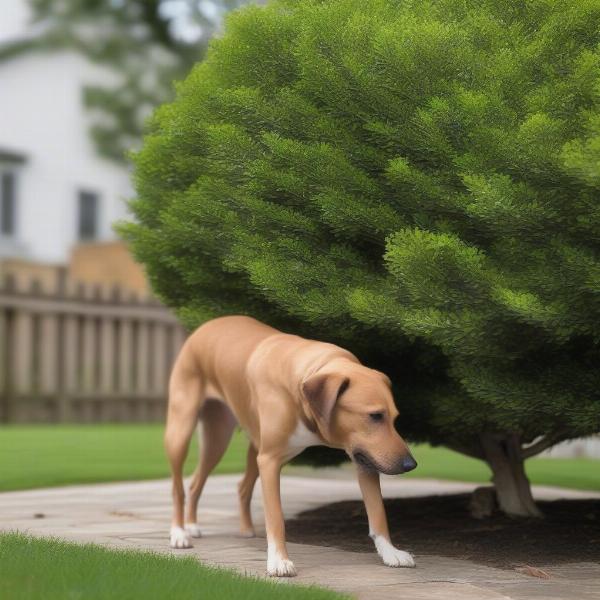Boxwoods are a common landscaping plant, prized for their lush green foliage and ability to be shaped into hedges or topiary. But if you’re a dog owner, you might be wondering, “Are boxwoods toxic to dogs?” The short answer is yes. Boxwoods contain alkaloids, specifically buxine and cyclobuxine, which are poisonous to dogs and can cause a range of unpleasant symptoms. Understanding the risks and taking preventative measures is key to keeping your canine companion safe.
Understanding Boxwood Toxicity in Dogs
Boxwood poisoning can occur if a dog ingests any part of the plant, including the leaves, stems, or roots. The severity of the symptoms depends on the amount of boxwood consumed and the size of the dog. While fatalities are rare, boxwood poisoning can be serious if left untreated. Knowing the signs and acting quickly can make a significant difference in your dog’s recovery.
 Dog near a boxwood plant
Dog near a boxwood plant
Symptoms of Boxwood Poisoning in Dogs
The symptoms of boxwood poisoning can manifest within a few hours of ingestion. Common signs include vomiting, diarrhea, drooling, weakness, tremors, and difficulty walking. In severe cases, dogs may experience seizures, respiratory distress, or even paralysis. If you notice any of these symptoms after your dog has been near boxwoods, seek veterinary attention immediately.
What to Do if Your Dog Eats Boxwood
If you suspect your dog has ingested boxwood, don’t wait for symptoms to appear. Contact your veterinarian or the nearest emergency animal clinic immediately. Time is of the essence when dealing with potential poisoning. If possible, bring a sample of the boxwood plant with you to the vet for identification and to help them determine the best course of treatment.
Preventing Boxwood Poisoning
Prevention is always the best approach. If you have boxwoods in your yard, consider replacing them with dog-friendly alternatives. If removal isn’t an option, ensure your dog is supervised whenever they are in the area where boxwoods are planted. Training your dog to avoid boxwoods can also be helpful, although it’s important to remember that training is never foolproof. Regularly inspecting your yard for fallen boxwood leaves and branches is also a good practice.
Dog-Friendly Landscaping Alternatives
Fortunately, there are many beautiful and dog-friendly alternatives to boxwoods. Consider planting shrubs like spiraea, viburnum, or forsythia, which are non-toxic to dogs and provide attractive foliage and flowers. Creating a safe and enjoyable outdoor space for both you and your furry friend is entirely possible with a little planning.
Conclusion
Boxwoods are indeed toxic to dogs. Understanding the risks, recognizing the symptoms, and taking preventative measures are crucial for responsible dog ownership. By choosing dog-friendly landscaping and being vigilant, you can create a safe and healthy environment for your beloved companion. If you suspect your dog has ingested boxwood, contact your veterinarian immediately.
FAQ
- What part of the boxwood is poisonous to dogs? All parts of the boxwood plant are toxic to dogs.
- How long does it take for boxwood poisoning symptoms to appear? Symptoms can appear within a few hours of ingestion.
- Can boxwood poisoning be fatal to dogs? While rare, fatalities can occur if left untreated.
- What are some dog-friendly alternatives to boxwoods? Spiraea, viburnum, and forsythia are good options.
- What should I do if my dog eats boxwood? Contact your veterinarian or emergency animal clinic immediately.
ILM Dog is a leading international pet website dedicated to providing expert advice on dog care and wellbeing. From breed selection and health to training and nutrition, ILM Dog offers a wealth of resources for dog owners worldwide. We cover everything from puppy care to senior dog care, and even traveling with your dog. For more information on dog health, breed information, or product recommendations, visit us at https://ilmdog.com. Contact us at [email protected] or +44 20-3965-8624.